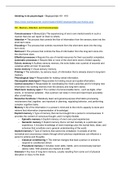Inleiding in de psychologie - Begrippenlijst H9 - H16
https://www.worldsupporter.org/nl/chapter/40463-begrippenlijst-psychology-gray
H9 - Memory, Attention, and Consciousness
Consciousness = (Bewustzijn) The experiencing of one’s own mental events in such a
manner that one can report on them to others.
Attention = The process that controls the flow of information from the sensory store into the
short-term store.
Encoding = The process that controls movement from the short-term store into the long-
term store.
Retrieval = The process that controls the flow of information from the long-term store into
the short-term store.
Effortful processes = Require the use of mental resources for their successful completion.
Automatic processes = Require little or none of the short-term store’s limited capacity.
Echoic memory = Auditory sensory memory, the echo fades over a period of seconds and
vanishes within at most 10 seconds.
Iconic memory = Visual sensory memory.
Priming = The activation, by sensory input, of information that is already stored in long-term
memory.
Phonological loop = Responsible for holding verbal information.
Visuospatial sketchpad = Responsible for holding visual and spatial information.
Central executive = Responsible for coordinating the mind’s activities and for bringing new
information into working memory from the sensory and long-term stores.
Short-term memory span = The number of pronounceable items - such as digits, other
words, or nonsense syllables - that a person can keep in mind and report back accurately
after a brief delay.
Executive functions = Relatively basic and general-purpose information-processing
mechanisms that, together, are important in planning, regulating behavior, and performing
complex cognitive tasks.
Memory = All of the information in a person’s mind and to the mind’s capacity to store and
retrieve that information (representation of knowledge).
Explicit memory = Type of memory that can be brought into a person’s consciousness. It
provides the content of conscious thought, and it is highly flexible.
- Episodic memory = Explicit memory of one’s own past experiences
- Semantic memory = Explicit memory that is not tied mentally to a particular past
experience, it includes knowledge of word meanings plus the myriad facts, ideas, and
schemas that constitute one’s general understanding of the world.
Implicit memory = Type of memory that cannot be verbalized. It consists of all the
nonverbal and unconscious means through which previous experiences can influence a
person’s actions and thoughts.
- Classical conditioning = The internal changes that lead a person or animal to
respond to conditioned stimuli.
- Procedural memory = Includes motor skills, habits, and unconsciously learned
(tactic) rules. With practice you improve at a skill.
Amnesia = Any loss of long-term memory, usually resulting from some sort of physical
disruption or injury to the brain.
, Temporal-lobe amnesia = Most strongly correlated with damage to the hippocampus, a
limbic-system structure buried within the temporal lobe, and cortical and subcortical
structures closely connected to it.
Infantile amnesia = The inability to remember events from infancy and early childhood.
Maintenance rehearsal = Process by which a person holds information in working memory
for a period of time.
Encoding rehearsal = Process by which a person encodes information into the long-term
store.
Elaboration = To think deeply about an item is to do more than simply repeat it; it is to tie
that item to a structure of information that already exists in long-term memory.
Chunking = A way to increase the number of items one can retain in the short-term store is
to group adjacent items that are at first perceived as separate, thus making them a single
item. This procedure decreases the number of items to be remembered and increases the
amount of information in each item.
Anterograde amnesia = The loss of capacity to form long-term memories of events
occurring after the injury.
Retrograde amnesia = Loss of memories of events that occurred before the injury.
Consolidation = Occurs when the labile memory form is converted into the table form.
Retrieval cue = A stimulus or thought that primes a particular memory.
Association by contiguity = Some concepts are associated because they have occurred
contiguously (together) in the person’s previous experience.
Association by similarity = Items that share one or more properties in common are linked
in memory whether or not they were ever experienced together.
Schema = One’s generalized mental representation, or concept, of any given class of
objects, scenes, or events.
Scripts = Schemas that involve the organization of events in time, rather than of objects in
space.
Prospective memory = We sometimes use memory to remember to do things in the future.





